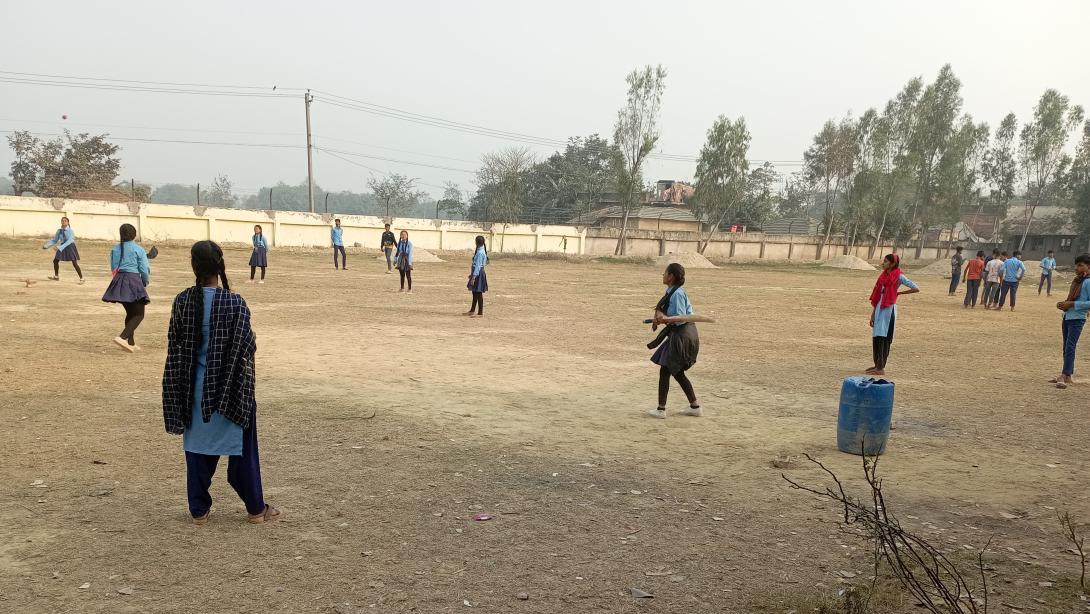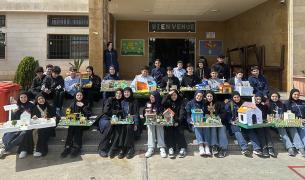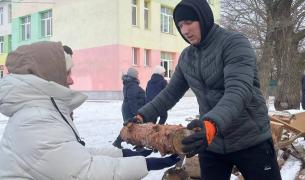Cultivating girls’ confidence and leadership through sports: Learning from Nepal and Uganda

From a young age, girls and women are less engaged in sports and physical activity compared to boys and men. The exclusion of girls and women in sports may be due to multiple factors, such as embedded sociocultural gender norms and expectations, a lack of physical spaces for girls, and caregiving responsibilities that fall on female household members.
Participation in sports has been shown to have numerous health and wellbeing benefits including impacting overall self-esteem and sense of achievement, which is particularly important when considering that girls often report feeling less confident than boys by the age of 14.
How does being involved in sports support girls’ leadership and development? Across Teach For All’s global network, teachers support the leadership and development of girls in their local communities. Farihah Fahmy, Teach For All’s Global Head of Girls Education, spoke to two members of our 2023 Global Girls Education Fellowship community- Teach For Nepal alumna Anjali Mehta and Teach For Uganda alumna Mirembe Deniz, to hear more about their efforts to ensure girls engage in team sports in their respective communities.
Farihah Fahmy (FF): Tell us about your sports program with girls in your school.
Anjali Mehta (AM): Girls in my school play cricket. For our school, this wasn’t the first ever sports game played by female students but it has been a continuous process of learning and engagement for these students. Recently we went to a different school's ground to play a friendly cricket match and the enthusiasm about playing on a different ground and for a new crowd made them practice every single morning for two straight hours. This may just seem so easy, but the reality is that all these girls hold full-time responsibility for household chores, i.e., cooking, cleaning, feeding, and serving their family members. These girls would wake up at 4 am just to make sure their regular life as a player didn't affect their responsibilities. During their practice sessions, we were very mindful in making sure that each girl enjoyed playing and felt they belonged. We would often join their practice and play with them in teams to always keep their spirits high. The cricket game was as normal as any sport would look like, with a very energetic audience and audience in the side field trying to pass comments on how they as females were not good enough for the sport. Yet I witnessed the zeal of both the teams to be present and unhindered by the comments and focused on their game and enjoyment.
Mirembe Deniz (MD): My sports program with girls in my school is a football club called Huracan FC Kanyabwina. It is called Huracan because we are funded by The Huracan Foundation (a UK-based charity started by Teach First alumnus Henry May). Our mission is to ensure that girls enroll and complete school and also acquire hands-on skills that will help them create transformation in their communities. My club is mainly focused on helping girls enroll and complete school. We work with over 200 girls in two primary schools in eastern Uganda in rural areas of Mayuge district. Among them, there are also teenage mothers to whom I offer counseling and guidance sessions. I also help them access skilling programs like hair styling, tailoring, and farming.
FF: Why was this something you felt was necessary for your students?
AM: We wanted to continue the legacy of external support for the female players to believe that they belong on the ground as much as any male member. We also wanted to strongly support the enthusiasm of students who played very well, even though they were average achievers in the classroom. I never realized how barrier-breaking it was for the female students to be playing a match outside their comfort zone, in a different community. Their consistent mindset of being unhindered by any comments from their goals and triumphing over every "no" they must have heard from their own family members was truly inspiring. In the end, the girls began to believe that "player" was a gender-neutral word.
MD: I work with girls from vulnerable homes attending Universal Primary Education schools in Uganda. The primary school completion rate for girls in Uganda is much lower when compared to boys. According to UNESCO Institute for Statistics, the primary school completion rate for girls in Uganda was 67% in 2019, compared to 77% for boys. This means that approximately 67 out of 100 girls complete primary school in Uganda. This is even worse in rural areas where the primary school completion rate for girls may be much lower than the national average. In the schools where I operate, before the clubs only four out of 10 girls would complete primary school education. The other six usually drop out due to early marriage, teenage pregnancy, and poverty.
FF: How has your community been involved in your program?
AM: Communities have been supportive of their girl children by not asking them to stop playing sports. This may seem irrational, but our community is one where female sports are not celebrated well. Guardians have been supportive by allowing their girl children to come to practice every day at 6 am. On the day of the match, we invited guardians to come, and a few did. For a few of the girls on the team, their parents have also supported them by simply asking them to play and enjoy themselves. This has a deep impact on their confidence, knowing that there is familial support for them.
MD: The community loves the work that the girls are doing and they are supportive by volunteering to help the girls through the football training. Parents have provided food for their children in school when they attend training sessions and other basic needs like clothes. At first they didn’t love the idea of girls playing football but seeing the results they bought into it and supported their daughters to play football with us.
FF: Can you tell us about any changes you’ve seen in your students since they became part of the program?
AM: I have seen several emotional and academic changes in the girls. Academically, I have witnessed them improve their grades, particularly in science, which is the subject that I taught. I believe that this improvement came from the confidence that they built over the practice sessions. They went from not knowing how to handle a cricket bat to playing beautifully, even when one of the boys would throw the ball at them. They gradually transferred this confidence to their studies, and they chose to learn bit by bit every day and improve.
It was inspiring to see the girls roll out every day for practice. If anyone was absent or didn't take practice seriously, the team would have meetings to inspire each other. They also handled their wins carefully, enabling an environment where they respected each other as players despite their differences in religion, caste, and class. The girls always talked about their household chores and advised each other and shared their ways of handling these responsibilities. When they wore their jerseys for the first time, if anyone felt uncomfortable wearing one, the team figured out alternatives to make her comfortable.
MD: The changes I have seen so far in my students since the program began is that there is an increased rate of school completion among the girls. At St. Kizito primary school eight out of the 10 girls on our team were able to sit the Primary Leaving Examination after the COVID-19 lockdown on schools and six of them transitioned to secondary school. There is also increased daily attendance of school among the children in the football clubs. Most of them attend school daily and participate in the school activities. Their performance rates have also improved as they are able to read, write, and are now confident to participate in school activities.
FF: What is some advice you would share with teachers and girls aspiring to engage in similar programs?
AM: You always need to listen to the audience you are catering to. In our case, it was the girls. We asked them what they would like to play. By asking them, we gave them the power and agency to choose. This also gave them the importance they have always wanted, valuing their opinions. As an educator, when you work with a group of girls, you need to stop comparing them to other children. Sometimes, we need to understand the gravity of where they belong before we position any task to them. Intersectionality has to play a major role in understanding and working with groups of girls.
MD: Enter it with an open mind and lots of patience. Training girls can be challenging in a patriarchal society that sees them differently. Helping the children unlearn things that have been told to them by society requires empathy and understanding. However, helping girls get through school and acquire skills is a noble cause that will benefit the girl involved, her community and generations to come. Let’s all give girls a chance to excel.
Learn more about Teach For All's Global Girls' Education Initiative.


